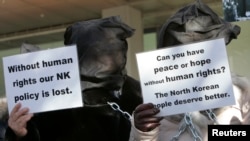SEOUL —
The government of North Korea on Friday condemned a U.N. committee's unanimous decision to investigate it for human rights abuses, calling it "an act of political fraud." The foreign ministry in Pyongyang, in a statement released through the Korean Central News Agency, said it completely rejects the resolution of the UN Human Rights Council and will ignore it.
The council, meeting in Geneva Thursday, voted to examine what it calls North Korea's "systematic, widespread and grave violations of human rights." Of particular focus will be imprisonment and execution of North Korean citizens for so-called political crimes, as well as torture and the kidnappings of foreigners over many decades.
South Korea's government says it expects the U.N. inquiry will contribute to an improvement of human rights in North Korea.
Kim Yun-tae, secretary general of the Seoul-based Network for North Korean Democracy and Human Rights, hailed the action as a breakthrough, noting that previous U.N. resolutions on North Korean human rights were just declarations. He predicted that this decision could lead to legal action being taken against Pyongyang if investigators determine the North has committed crimes against humanity.
Kim added that while North Korea likely will not accept the commission's findings, it could play a strong psychological role in leading to an improvement of conditions for the people living in the repressive state.
As a result of the U.N. Council's action, three experts will spend one year intensively investigating the human rights abuses and, in particular, those violations that "may amount to crimes against humanity."
The decision is also being praised by non-governmental organizations. Human Rights Watch said the establishment of the commission “sends a strong message to Pyongyang that the world is watching and its abuses must end.”
In a statement, Amnesty International called for going beyond satellite imagery to map the extent of the North Korean prison camp system, saying independent human rights observers urgently need unfettered access to the facilities.
Meanwhile, the administration of South Korean President Park Geun-hye, in power for one month, has approved a shipment of aid to the North by a private charity group.
The Seoul-based Eugene Bell Foundation will deliver $600,000 worth of tuberculosis medicine to eight clinics it runs in North Korea next month.
A spokesman for South Korea's Unification Ministry, in charge of relations with the North, stresses the approval should be seen as a humanitarian concern, not as a conciliatory gesture at a time military tensions on the peninsula are "highly elevated."
The council, meeting in Geneva Thursday, voted to examine what it calls North Korea's "systematic, widespread and grave violations of human rights." Of particular focus will be imprisonment and execution of North Korean citizens for so-called political crimes, as well as torture and the kidnappings of foreigners over many decades.
South Korea's government says it expects the U.N. inquiry will contribute to an improvement of human rights in North Korea.
Kim Yun-tae, secretary general of the Seoul-based Network for North Korean Democracy and Human Rights, hailed the action as a breakthrough, noting that previous U.N. resolutions on North Korean human rights were just declarations. He predicted that this decision could lead to legal action being taken against Pyongyang if investigators determine the North has committed crimes against humanity.
Kim added that while North Korea likely will not accept the commission's findings, it could play a strong psychological role in leading to an improvement of conditions for the people living in the repressive state.
As a result of the U.N. Council's action, three experts will spend one year intensively investigating the human rights abuses and, in particular, those violations that "may amount to crimes against humanity."
The decision is also being praised by non-governmental organizations. Human Rights Watch said the establishment of the commission “sends a strong message to Pyongyang that the world is watching and its abuses must end.”
In a statement, Amnesty International called for going beyond satellite imagery to map the extent of the North Korean prison camp system, saying independent human rights observers urgently need unfettered access to the facilities.
Meanwhile, the administration of South Korean President Park Geun-hye, in power for one month, has approved a shipment of aid to the North by a private charity group.
The Seoul-based Eugene Bell Foundation will deliver $600,000 worth of tuberculosis medicine to eight clinics it runs in North Korea next month.
A spokesman for South Korea's Unification Ministry, in charge of relations with the North, stresses the approval should be seen as a humanitarian concern, not as a conciliatory gesture at a time military tensions on the peninsula are "highly elevated."





